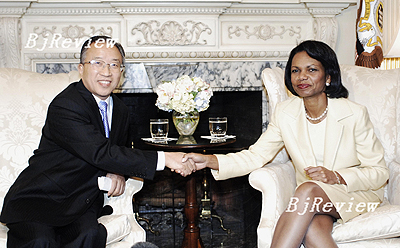
Since Chinese and U.S. diplomats wrapped up their fourth Strategic Dialogue in Washington on June 21, officials in both countries have underscored the importance of the dialogue mechanism in resolving crucial issues.
"I think it is a very important mechanism," says Harry Harding, Director of Research and Analysis of Eurasia Group, and a leading China specialist. "It is a way of trying to find areas of cooperation between the two countries on both regional and global issues as well as matters that we have differences with. We've learnt from the Strategic Economic Dialogue that sometimes progress is very difficult but the effort is worthwhile."
Niu Xinchun, a research fellow at the China Institutes of Contemporary International Relations (CICIR), says the China-U.S. dialogue has matured after four rounds of talks and is beginning to play an important role in the two countries' relations. During the two-day dialogue, which Washington prefers to call Senior Dialogue, major recent developments in bilateral relations were reviewed to provide a good platform on which to map out the future, according to media reports. Labeled "frank and constructive" by the U.S. State Department, the talks also touched on a wide range of international issues, such as the de-nuclearization of the Korean Peninsula, Darfur, climate change and nuclear non-proliferation. Leading the delegations were Chinese Vice Foreign Minister Dai Bingguo and U.S. Deputy Secretary of State John Negroponte.
The foundation for the bi-annual dialogue mechanism was laid down in the consensus reached between President Hu Jintao and President George W. Bush in 2004. The first dialogue was held in August 2005. In the two years since, the China-U.S. Strategic Dialogue has evolved from a comprehensive communication platform to a specialized dialogue mechanism, says Niu of the CICIR. He notes that the dialogue was "all inclusive" at the beginning, covering politics, economy, energy and environment, among others. Since the China-U.S. Strategic Economic Dialogue was initiated in 2006, however, the Strategic Dialogue has mainly focused on political affairs and security. This transition marked major progress in the development of the dialogue mechanism, Niu says, since a specialized dialogue is more conducive to in-depth exchange of views and consensus building.
At the same time, Niu observes that there have been changes in the scope of the Strategic Dialogue. He points out that the fourth round of the dialogue transcended the boundaries of bilateral relations to address major issues that bear on regional and international peace. The expert opines that China and the United States, as two major world powers, need to reach agreements on current international issues in their bid to promote the development of bilateral relations as well as peace and stability in the world. This is a positive trend, he affirms, as it conforms to the two countries' international standings.
"The Strategic Dialogue is becoming increasingly open," he continues. "Unlike the previous rounds where the two sides remained extremely cautious, the fourth round of the dialogue drew the participation of media organizations, think tanks and scholars. They all took this opportunity to air their opinions on various topics they'd been apprised of before the talks."
The Strategic Dialogue, Niu says, is beginning to address long-term strategic issues, apart from pressing concerns. For example, discussions on a security mechanism in Northeast Asia were also on the priority list this time.
Shaping a new world order
Despite the fact that few details of the discussions were made public, the Strategic Dialogue triggered several expert opinions on the development of China-U.S. relations. Shi Yongming, a research fellow at the China Institute of International Studies, tells Beijing Review that at present the China-U.S. relationship is at a historical juncture, and the two countries are expected to lay the groundwork for future relations. Whether they can regard each other as "real partners" will have a crucial bearing on the international situation, he notes.
He further predicts that the United States will have to switch to a less tough approach when dealing with international issues. It will have to rely more on cooperation with other major powers, he asserts, and soliciting China's support is set to top Washington's strategic agenda in the coming years as China's influence on the globe grows stronger.
For China, how to make the most of this opportunity remains a challenge. "Refusing to cooperate with the United States will obviously do it no good," he says. "However, as it tries to cooperate with the United States, it will find many of the latter's positions unacceptable. So the two countries need to discuss how to shape the future of the world through their Strategic Dialogue. However, whether the dialogue can produce desired results has yet to be observed."
Zhang Guoqing, a researcher at the Institute of American Studies, Chinese Academy of Social Sciences, echoes this view. While emphasizing the strategic interaction between the two countries, he believes that Washington's policy toward Beijing hinges on its understanding of China's development and future.
(With reporting by Chen Wen from New York City) | 